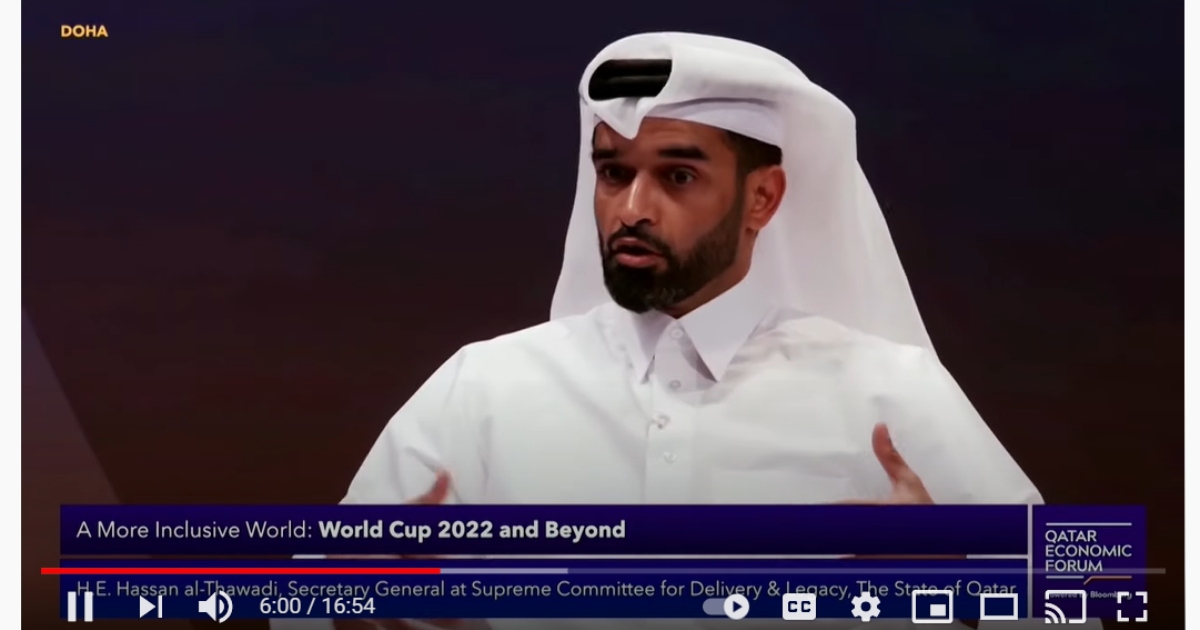

Football’s power to unite billions of people was discussed during the Qatar Economic Forum, with H.E. Hassan Al Thawadi, Secretary General of the Supreme Committee for Delivery & Legacy, saying the FIFA World Cup Qatar 2022™ had taken on added significance in light of the COVID-19 pandemic.
Speaking during a one-on-one interview with Simone Foxman, Middle East Correspondent for Bloomberg Television, Al Thawadi said: “This will be the first global event where people can attend and celebrate overcoming the pandemic together. As vaccines are becoming available, we are seeing a gradual return to normalcy – and as a result we are certain that we will be able to host a safe event that everyone can enjoy.”
Al Thawadi went on to say the tournament is playing a major role in boosting Qatar’s economic growth and diversification.
“From the beginning, we have been committed to ensuring that the tournament acts as a catalyst for initiatives in urban planning and economic diversification. Being a major tournament, Qatar 2022 will undoubtedly have positive cascading effects on the economy in general and will be a catalyst towards the development of a sports economy in Qatar specifically,” said Al Thawadi.
Qatar’s compact tournament concept was also discussed during the event. Fans will arrive at one airport and stay in one accommodation throughout the event. They will never be far from the action, with the longest distance between stadiums just 75km by road.
Al Thawadi said: “Not only will Qatar 2022 be the first World Cup in the Middle East and Arab world, it will also be the most compact version in the tournament’s modern history. Close distances will mean that fans can attend more than one match a day and players can stay in one place and not endure the hardships of long-distance travel.”
Nasser Al Khater, Chief Executive Officer of the FIFA World Cup Qatar 2022 LLC, also attended the forum. He took part in a panel discussion titled, ‘Securing the lasting impact of sporting mega-events’.
Al Khater outlined Qatar’s commitment to safely organising major events during the pandemic – including a number of high-profile football matches.
“We’ve hosted over 100 games since September and geared our planning towards returning fans to the stadiums. We’ve had no cases [of COVID-19] and created a playbook which is available for all to share our learnings.”
Al Khater went on to discuss the tournament’s legacy in terms of infrastructure and referenced Qatar’s plans to repurpose stadiums after 2022.
“Many countries have struggled using their stadiums after hosting major events. We decided to think about legacy right from the start. For example, Ras Abu Aboud Stadium will be completely dismantled after 2022, while six of the other stadiums will have their number of seats reduced.”
In July, Qatar will mark the 500-day countdown to the World Cup. The tournament will kick off on 21 November 2022 and conclude 28 days later on 18 December – on Qatar’s National Day.
The Qatar Economic Forum was organised by the Ministry of Commerce and Industry and hosted in collaboration with a number of partners, notably Bloomberg, the international financial data and analysis company. This year’s event, which was held online, brought together some of the world’s most influential financial and economic thinkers, policy makers and business leaders under the theme ‘New Perspectives for Tomorrow’.

